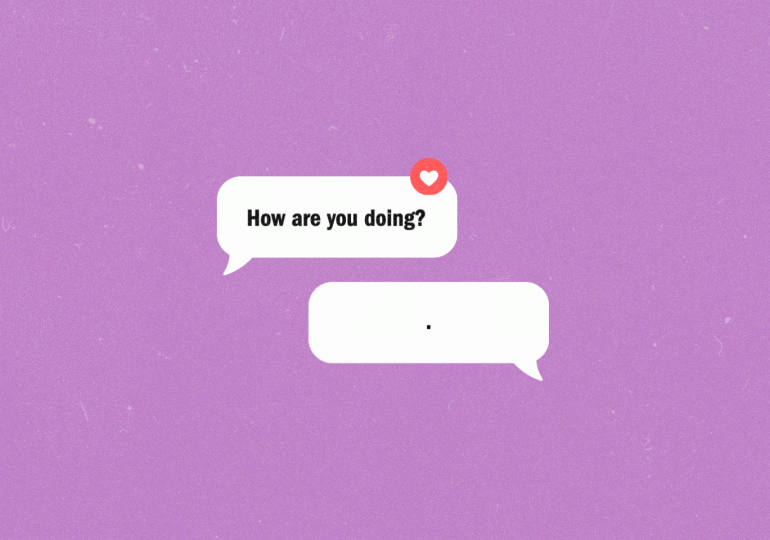More than a decade ago, Thomas Derrick Hull, a clinical psychologist who researches digital health, had what felt like a wild thought. What if therapists, who can’t keep up with demand for mental-health care in the U.S., started texting their patients instead of making them come into the office?
Back then, it seemed unlikely even to Hull that patients and providers could use a screen to forge the bonds and meaningful conversations that blossom face-to-face. But the benefits were appealing: texting is cheap, fast, accessible, and easy to do on the fly, potentially allowing therapists to have regular interactions with their patients rather than waiting for a weekly session. So Hull began studying the efficacy of text-based care, eventually doing so as an executive at the online therapy provider Talkspace. (He left the company in 2020 and now works for a digital wellness startup.)
[time-brightcove not-tgx=”true”]
Even if texting turned out to be only 60% or 70% as effective as traditional therapy, the convenience and accessibility could make it a better-than-nothing option, Hull used to think. “That felt like a fair trade,” Hull says. “But as we started looking at the data, it turned out that it seemed to be just as effective.”
Recent research—some of it funded by text therapy providers like Talkspace—continues to suggest that texting is a legitimate and effective way to deliver mental-health care to people of all ages. In a study published in July, for example, Hull and other researchers found that therapy by text or voice note is just as good as teletherapy—which has itself been shown to be roughly as effective as face-to-face therapy—at relieving symptoms of anxiety and depression over the course of three months.
That means people who like the idea of texting a therapist should feel confident they’re getting the same quality of care as people who opt for video appointments, says the study’s senior author Michael Pullmann, who conducted it while a research professor at the University of Washington School of Medicine.
Read More: How to Make a Long-Distance Friendship Work
How can that be, when the connection between a patient and therapist is thought to be one of the best predictors of whether treatment will succeed? Can that bond really develop over text? The American Psychological Association hadn’t taken an official stance on text therapy as of 2015, and some therapists remain skeptical of the idea. But a 2021 research review suggests strong ties can grow by text or email, just as they do in person. Other research even finds that people can “bond” with AI chatbots.
Some research does suggest that face-to-face relationships yield better results than online bonds—but Adrian Aguilera, an associate professor at the University of California, Berkeley, who researches digital health, isn’t too worried about that. Aguilera says he cares less about whether text therapy is as effective as face-to-face therapy, and more about whether it’s better than nothing—because that’s how much mental-health care most people in the U.S. receive today. “Is it the best? Probably not,” he says. “A better question is, ‘Can it meet an unmet need?’”
Read More: 11 Things to Say When Someone Dies Besides ‘I’m Sorry’
The answer seems to be positive. During the pandemic, Aguilera tested a system where people received daily automated text messages meant to improve mental health. (An example: “Self-soothe is an important skill for coping with distress. What are two ways that you can use your senses [e.g., smell, taste, touch] that will be calming?”) Across the board, people who got the texts reported improvements in their anxiety and depression symptoms after 60 days. But the program seemed to be especially beneficial for Latinx users, who reported learning new information from the messages, perhaps because they were less likely than white participants to have previously received mental-health care.
Aguilera’s other research has also shown that patients tend to stay in therapy longer when it includes a text-based element. And maybe that’s not so surprising, given that almost all of us are glued to our phones these days. “Have you ever texted a friend when you’ve been upset or anxious about something?” Pullmann asks. Almost certainly, the answer is yes.
Just like in casual conversation, texting with a therapist provides both the benefit of immediacy (you can fire off a message as soon as a difficult feeling arises) and asynchronicity (the person on the other end can take time to craft a thoughtful reply), Pullmann says.
Some people may also find it easier to express a dark, embarrassing, or vulnerable thought in writing—and research consistently finds that people benefit from translating their thoughts into written words, Hull notes. Plus, he says, text therapy may offer the benefits of “state-based learning,” that old psychological principle that it’s best to study for a test in the room where you’ll take it. In other words, it’s possible that therapeutic principles sink in better when they’re delivered in environments where people will actually need those insights, like at home or work.
Read More: Should You Work Out if Your Muscles Are Sore?
Text therapy is not perfect. Two of the biggest online providers, Talkspace and BetterHelp, have faced criticism, with Talkspace the subject of a class-action lawsuit alleging it has charged users money even when therapists aren’t available to meet with them. (All claims in the lawsuit have now been either dismissed or settled, according to a statement from Talkspace.) In a 2022 Wall Street Journal article, providers who worked with Talkspace also criticized the quality of care offered on the platform.
In a statement provided to TIME, Dr. Nikole Benders-Hadi, Talkspace’s chief medical officer, said that the platform’s therapists are vetted and licensed, and that research suggests text therapy is effective. “Imagine having an always-on, open-door option for people to communicate with their therapists, rather than bottling things up and waiting for their next session,” Benders-Hadi said in the statement. “Ultimately what is most important is meeting members where they are, and letting them choose the modality that works best for how they would like to engage with therapy.”
Meanwhile, BetterHelp last year agreed to pay almost $8 million to settle charges from the Federal Trade Commission regarding improper data-sharing practices. In a public statement after the settlement, the company said its “technology, policies, and procedures are designed to protect and secure our members’ information so it is not used or shared without their approval and consent.”
BetterHelp has also recently faced backlash on social media from customers who say its clinicians gave bad advice or behaved inappropriately. In a statement provided to TIME, a spokesperson for BetterHelp did not directly address those allegations, but emphasized that the company provides “many ways” for clients to connect with therapists, including phone and video calls, and said it is “very rare” for members to exclusively use text messages.
Quality control is an issue with any form of therapy, Hull says. There will always be good therapists and bad therapists, good patient matches and bad ones, whether appointments happen in a private practice or through an iPhone.
“I don’t think there’s anything about message-based care that reduces quality, in principle,” he says. Increasingly, the data are on his side.
Leave a comment



